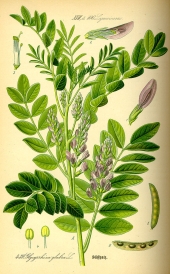








Sometimes the answer is not to cross an old bridge, nor to burn it, but to build a better bridge.




.




 I concur with Dandelion as an excellent bitter herb and the only one I would consider safe to consume in large quantities.
I concur with Dandelion as an excellent bitter herb and the only one I would consider safe to consume in large quantities.Idle dreamer









Sometimes the answer is not to cross an old bridge, nor to burn it, but to build a better bridge.








Previously known as "Antibubba".




Sometimes the answer is not to cross an old bridge, nor to burn it, but to build a better bridge.













ronie wrote:
Chewing stimulates paristalsis (smooth muscle contractions that move food along the intestine).
Bitter stimulates appetite hormone called ghrelin that increases appetite, but then decreases paristalsis. So the effect is to make one eat more foods - then the slower digestion seems to keep you feeling full for a long time.
Eating Bitter Melon is thought to help one lose weight.
QuickBooks set up and Bookkeeping for Small Businesses and Farms - jocelyncampbell.com




Sometimes the answer is not to cross an old bridge, nor to burn it, but to build a better bridge.








outdoorlunatic wrote:
Greenbriar (Smilax spp.), is a bitter plant that I've taken in very high concentration (in the form of leaf juice) without negative effects. I believe Euell Gibbons also said that he consumed large amounts of it also without negative effects. It's a very good bitter, and a very good tonic, which has given me a lot of energy when I took it.
Sometimes the answer is not to cross an old bridge, nor to burn it, but to build a better bridge.




ronie wrote:
Taking something because of a lack of negative effect leaves me wondering - what are the positive effects that you get from green briar?




Sometimes the answer is not to cross an old bridge, nor to burn it, but to build a better bridge.




ronie wrote:
So you just use the leaves or the leaves and the shoots? I eat the young tender shoot ends raw, but I've never tried the leaves. I read all Euell Gibbons - but I guess I don't remember his comments on green briar.
Do you think it has a pain numbing effect on your back or is it a bonus from the other effects you mentioned?




Sometimes the answer is not to cross an old bridge, nor to burn it, but to build a better bridge.




Ran Prieur wrote:
This is a weird question. I really like bitter flavors! I already eat dandelion leaves and mountain ash berries and sip homemade oregon grape root tincture. But I know that bitter flavors often come from powerful compounds that are not safe for long-term use. So I'm wondering which bitter herbs are safest (and also cheap).
acupuncture and herbal medicine
www.janettecormier.com












So, I'm a bit confused about bitters now. Do they stimulate or slow digestion? (Or both or it depends?)

























|
You get good luck from rubbing the belly of a tiny ad:
Learn Permaculture through a little hard work
https://wheaton-labs.com/bootcamp
|





